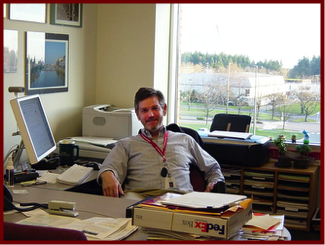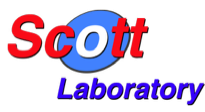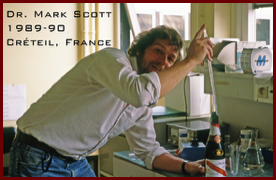About
Dr. Scott's undergraduate degrees (B.A. Biology; B.A. Psychology) were obtained from Western Colorado University (then Western State College; Gunnison, Colorado) in 1979. Post graduation, he served as a rodent control biologist in the US Peace Corps in Dakoro, Niger. Following the Peace Corps, and after working for a few years as a wastewater laboratory technician, Mr. Scott returned to Western where he obtained a Masters in Science (Biology) in 1984. Mr. Scott pursued his Ph.D. in Pathobiology (Department of Laboratory Medicine and Pathology) in Dr. John Eaton's laboratory at the University of Minnesota (Twin Cities) which he completed in December 1987.
In January 1988, Dr. Scott accepted a postdoctoral position with Dr. Bertram Lubin at Children's Hospital Oakland Research Institute (CHORI; Oakland, California) where he studied the oxidant defense pathways [superoxide dismutase, catalase, glucose-6-phosphate dehydrogenase, and NADP(H)] of red blood cells (RBC). These studies led to extensive research efforts on oxidant-driven hemoglobinopathies (primarily thalassemia) and malaria. In 1989-1990, Dr. Scott was a visiting Research Fellow with the Institut National de la Santé et de la Recherche Médicale (Dr. Yves Beuzard; INSERM; Unité 91, Hôpital Henri Mondor) in Créteil, France where he continued to focus on the pathophysiology of unpaired alpha hemoglobin chains (found in Beta Thalassemia) on RBC structure and function. In 1990 Dr. Scott was promoted to an Assistant Research Biochemist (Assistant Professor) at CHORI. A key tool of the above research involved the use of 'resealed red blood cells' in which the intracellular constituents of RBC could be manipulated via osmotic lysis and resealing. Importantly, the resealed RBC have normal structure, function and survival in vivo. Moreover, these cells could be used to determine the mechanisms of injury induced by unpaired alpha hemoglobin chains as well as to culture human malaria allowing for a novel means to examine the host-parasite interface.
In 1993 Dr. Scott was recruited to Albany Medical College (AMC; Albany, NY) to continue his research. In 1996, Drs. Scott and John Eaton (now at AMC) pioneered the immunocamouflage of intact cells via the covalent grafting of low immunogenic nanoscale polymers to the cell surface as a potential tool to prevent RBC alloimmunization (where the blood recipient makes antibodies to the donor RBC making life saving transfusions difficult to do) that commonly occurs in chronically transfused patients. Dr. Scott's research subsequently focused on the applications of immunocamouflaged cells in transfusion, transplantation and infectious disease medicine. Dr. Scott's laboratory simultaneously developed the necessary manufacturing and delivery technologies for the clinical implementation of the immunocamouflage technology.
In 2002, Dr. Dana Devine, Director of Research and Development at Canadian Blood Services (CBS; the national provider of blood to Canadians) and the Department of Pathology and Laboratory Medicine at the University of British Columbia (UBC; Vancouver, Canada) recruited Dr. Scott to join the newly created Centre for Blood Research (CBR) in Vancouver, Canada. Dr. Scott's lab continued to focus on transfusion medicine as well as to elucidate the effects of immunocamouflage on the recipient's immune response. These studies demonstrated that the immunocamouflage technology could be used to systemically immunomodulate the immune response and reduce the risk of tissue rejection and inhibit the development of autoimmune diseases. During the course of these studies, it was discovered that alterations in the microRNA (miRNA) bioregulatory pathways mediated the polymer-induced immunomodulation. Dr. Scott's laboratory subsequently developed miRNA therapeutics that could be used to either down- or up-regulate the immune response by mimicking the natural bioregulatory miRNA control pathway. Treatment of mice that spontaneously develop Type 1 Diabetes (an autoimmune disease) with a tolerogeneic miRNA cocktail dramatically reduced the incidence of disease and helped maintain normal pancreas histology. Treatment of naive lymphocytes with a pro-inflammatory miRNA cocktail enhanced the killing of cancerous, but not normal, cells suggesting its possible utility in cancer immunotherapy.
In addition to his research efforts, from 2003-2013 Dr. Scott was the Associate Director for Intellectual Property and Business Development at CBS where he oversaw the evaluation of potential patents and the prosecution and licensing of pending and issued patents. At UBC, Dr. Scott received multiple teaching awards within the Bachelor of Medical Laboratory Science (BMLSc) program. In 2022 Dr. Scott retired as a Senior Scientist from CBS and in 2023 transitioned to Clinical Professor Emeritus at the UBC.
Founded in 2002, the UBC Centre for Blood Research (CBR) applies emerging methods in biotechnology to the study of blood and blood processing in an integrated, interdisciplinary manner to create new knowledge in pursuit of health
Useful Links
Canadian Blood Services manufactures and manages the blood supply for all Canadians. Created by Canada in 1998, it operates at arms length from the government of Canada.
The Scott laboratory has published extensively in peer-reviewed journals and received funding from the US National Institutes of Health (NIH), Canadian Institute for Health Research (CIHR), and the Canadian Blood Services (CBS). The laboratory's research has yielded multiple issued (US and European) patents in the areas of hematology, immunology, microbiology and virology.

University of British Columbia circa 2005
This work would not have been possible without the talented help of Graduate Students, Postdoctoral Fellows, Undergraduate Students, and, very importantly, Technicians that have worked in Dr. Scott's Laboratory over the years.
Graduate Students
Albany Medical College: Laurian Magdea (M.S.; 1993-1995); Edward Sim (M.S.; 1993-1996); Kari Murad (Ph.D.; 1993-1997); Margaret Talbot (M.S.; 1993-1998); Selma Mizouni (M.S.; 1997-2000); Audrey Chen (Ph.D.; 1997-2001)
University of British Columbia: Lori McCoy (Ph.D.; 2000-2005); Yevgeniya Le (Ph.D.; 2004-2010); Ibrahim Mustafa (Ph.D.; 2004-2011); Jennifer Yuen (M.S.; 2005-2008); Troy Sutton (Ph.D.; 2005-2009); Dana Kyluik-Price (Ph.D.; 2009-2014); Xining (Linda) Yang (Ph.D.; 2013-2018); Emel Islamzada (Ph.D.; 2017-2024)
Postdoctoral Researchers
Albany Medical College: Dr. Amanda Bradley (1998-2000); Dr. Kari Murad (1998-2001)
University of British Columbia: Dr. Duncheng Wang (2008-2014); Dr. Li Li (2011-2015); Dr. Yevgeniya Le (2011-2012); Dr. Ning Kang (2014-2019); Dr. Dana Kyluik-Price (2014-2015); Dr. Meera Raj (2016-2019)
Technicians
Children's Hospital Oakland Research Institute: Charis Wagner (1991-1993); Lynn Zuo (1990-1991)
Albany Medical College: Katy Mahany-Regan (1996-2001); Wendy Toyofuku (2001)
University of British Columbia: Wendy Toyofuku (2002-2022); Jonathan Ho (2003-2006); Eric Trinh (2003-2004); Janet Tong (2004-2009); Nobu Nakane, M.S. (2005-2009); Amanda Kwan (2010-2012); Luxi (Lucy) Wang (2012-2022)
Undergraduate Researchers
Albany Medical College: Tania Magoon (1998); Anita Magoon (1996-1998)
University of British Columbia: Joanne Kwan (2011-2012); Amanda Kwan (2012-2013); Eunice Kwok (2014-2015); Ryan Tan (2019-2021)
Innumerable other people (collaborators, support staff, etc) similarly contributed to our success over the years.





